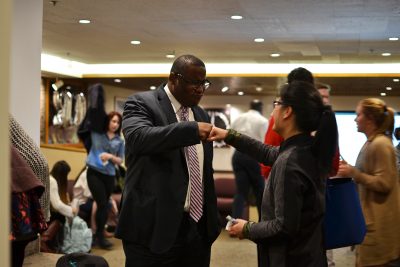
Approximately a dozen people gathered in the lobby of Boston University’s School of Education Tuesday evening for “BU Tuesday for Tito,” a campaign meeting for Tito Jackson, who is currently the city councilor for Boston’s District 7 and is campaigning to be the mayor of Boston.
Samantha Kubota, a campaign fellow for Jackson who organized the event, said the meeting aimed to generate more support among BU students for Jackson’s campaign.
“A lot of BU students are looking to learn more about the city they live in,” Kubota, a junior in SED, said before the meeting. “We wanted to emphasize the importance of getting involved in the community even if one is not registered to vote in Boston.”
Jackson began the discussion by speaking about the importance of local elections.
“Local governments are the government you can see,” Jackson said. “Even when things are good at the federal level, if you don’t have a local government that is responsive to your needs [federal mandates don’t help].”
Jackson said his mayoral plan focuses on reducing the disparities between Boston residents by improving education, increasing affordable housing, reducing hunger and increasing democracy in Boston’s government.
If elected, Jackson said he plans to reintroduce hands-on learning to public schools.
“The current focus on standardized assessments means that students lose that understanding of spatial aspects, and actually moving stuff around, [which] might help you in math later on,” Jackson said.
Jackson then spoke about the need to redefine affordable housing on an individual neighborhood basis so that each neighborhood’s housing is affordable for its residents.
“Fifty percent of people in Boston make less than $35,000,” Jackson said. “Most of our affordable housing programs start at above $65,000. This lack of income contributes to a huge food disparity, which contributes to a difference of 33 years [in] life expectancy, in my district alone.”
Jackson said he hopes to combat this chronic food shortage by introducing a program called “Project 68,” introducing local food into the public school system, and increasing support to community farms.
Project 68 gets its name from the number of hours between the end of the school day on Friday and the start of school on Monday, during which many children in Boston go without food. Jackson said he wants to end this problem by sending all schoolchildren home each Friday with 15 pounds of food in a backpack, regardless of whether they qualify for free or reduced price school meals.
Jackson said that food deserts, or large areas without any grocery stores, is a particular issue for many people in his district, especially when fast food is often the cheapest option.
“We live in a day and age where it’s a dollar for a double cheeseburger and six dollars for arugula,” Jackson said.
Jackson said that although many community farms halve their prices for people who buy food with government subsidies, there is still a lot of progress to be made. He stressed the importance of diversified and democratized city agencies.
“It is important for Boston to have a city government that looks like us, thinks like us, but most importantly sees us,” Jackson said.
Jackson said he plans to accomplish this diversification and democratization in part by making the school committee an elected body instead of one appointed by the mayor, with two seats reserved for students, saying he believes students are experts in their own education.
Jackson finished his speech by encouraging students who attended the meeting to run for office or to mentor with Big Brothers and Big Sisters and pay forward the opportunities received by being at BU.
“The greatness of a city is not based on the people who are in the tallest buildings who make the most money,” Jackson said. “The greatness of a city is what we do for the young people who are having a tough time, and those families having a tough time.”
Several students said they appreciated the opportunity to learn more about Jackson’s campaign.
Lillian Lewis, a sophomore in the College of General Studies, said she came because she agrees that it is important to be engaged in the community.
“Jackson’s campaign plan appeals to me because he is passionate and a great role model for kids to look up to,” Lewis said.
Varsha Srivastava, a junior in the College of Communication, said she attended the meeting to invite Jackson to appear on the Howard Thurman Center for Common Ground’s podcast, “The Common Thread.”
“I approached Jackson because the podcast’s goal is to learn about what’s going on around campus and the city, so I wanted to learn more about his candidacy,” Srivastava said.
Mairead Mazan, a SED junior and education director of Generation Citizen, an educational group that has worked closely with Jackson, said Jackson supports a lot of issues that are important to her.
“He wants to empower students who don’t feel empowered, which goes hand in hand with Generation Citizen’s goals,” Mazan said.


















































































































